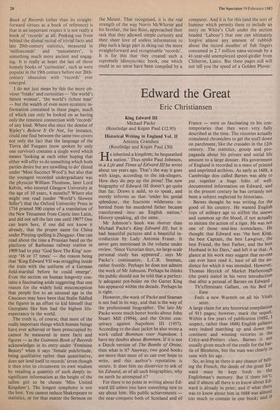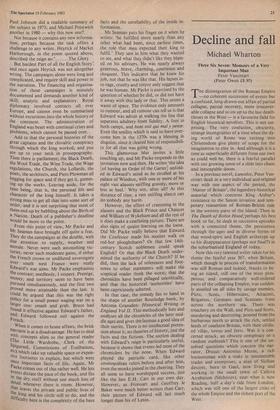Edward the Great
Eric Christiansen
King Edward III Michael Packe (Routledge and Kegan Paul £12.95) Historical Writing in England Vol. II Antonia Grandsen (Routledge and Kegan Paul £30)
.He inherited a kingdom; he bequeathed a nation.' Thus spake Paul Johnson, in a Life and Times of Edward III he wrote about ten years ago. That's the way it goes with kings, according to the ink-slingers. How they do pep up the prose! The new biography of Edward III doesn't go quite that far. Draws it mild, so to speak, and merely informs us that 'under his genial splendour, the fractious wilderness in- herited from his murdered father became transformed into an English nation.' History speaking, all the same.
Mr Johnson's book was shorter than Michael Packe's King Edward III, but it had beautiful pictures and a beautiful in- troduction by Lady Antonia Fraser. It never gets mentioned in the volume under review. 'Since Victorian days, no large-scale personal study has appeared', says Mr Packe's continuator, L.C.B. Seaman, rather frostily. Perhaps he does not admire the work of Mr Johnson. Perhaps he thinks the public should not be told that a perfect- ly adequate pot-boiler on the Garter King has appeared within the decade. Perhaps he is right.
However, the work of Packe and Seaman is not bad in its way, and that is the way of the professional biographer. The late Mr Packe wrote much better books about John Stuart Mill (1954), and the Orsini con- spiracy against Napoleon III (1957). According to the dust jacket he also wrote a work called Bommen voor Napoleon. I have my doubts about Bommen. If it is not a Dutch version of The Bombs of Orsini, then what is it? Anyway, two good books are more than most of us can ever hope to write, and this author's reputation is secure. It does him no disservice to ask of his Edward, as of all such biographies, why on earth he attempted it?
For there is no point in writing about Ed- ward III unless you have something new to say about him. His public achievements the near-conquest both of Scotland and of France — were so fascinating to his con- temporaries that they were very fully described at the time. The victories actually stimulated chroniclers to get the stuff down on parchment,'like the crusades in the 12th century. The statistics, gossip and pro- paganda about his private and social life amount to a large dossier. His government of England is recorded in a mass of printed and unprinted archives. As early as 1688, a Cambridge don called Barnes was able to put together a huge folio of well- documented information on Edward, and in the present century he has certainly not been a subject neglected by historians.
Barnes thought he was writing for the good of his country. He wanted English fops of military age to stiffen the sinews and summon up the blood, if not actually to imitate the action of a tiger. He was not one of those soul-less iconoclasts. He thought that Edward was 'the best King, the best Captain, the best Lawgiver, the best Friend, the best Father, and the best Husband in his Days,' and left it at that. A glance at his work may suggest that no-one can ever have read it, least of all the au- dience for which it was intended. However, Thomas Heyrick of Market Harborough (the poet) stated in his verse introduction that after a perusal of Barnes on Edward Th'effeminate Gallant, on his Bed of Ease Feels a new Warmth on all his Vitals seize.
A large claim for any historical compilation of 911 pages; however, mark the sequel. Within a few years of publication (1692, I suspect, rather than 1688) English gallants were indeed marching up and down the continent and winning victories in the Crecy-and-Poitiers class. Barnes is not usually given much of the credit for the bat- tle of Blenheim, but the man was clearly in tune with his age. So, as long as there is any chance of biff- ing the French, the deeds of the great Ed- ward must be kept fresh in the EngliShman's memory. But if there isn't; and if almost all there is to know about Ed- ward is already in print; and if what there was to know about him in 1688 was almost too much to contain in one book; and if Paul Johnson did a readable summary of the subject in 1973; and Michael Prestwich another in 1980 — why this new one?
Not because it contains any new informa- tion; perhaps because the task offers a challenge to any writer. Heyrick of Market Harborough, in the poem quoted above, described the reign as: The Glory But hardest Part of all the English Story and once again Heyrick was not altogether wrong. The campaigns alone were long and complicated, and require skill and power in the narration. The financing and organisa- tion of those campaigns is minutely documented and demands another kind of skill; analytic and explanatory. Royal diplomacy involved contacts all over Europe, and cannot even be summarised without excursions into the whole history of the continent. The administration of England was beset with continual crises and problems, which cannot be passed over.
Add to that the personal histories of the great captains and the chivalric conspiracy through which the king worked, and you are up to your neck in prosopography. Then there is parliament; the Black Death, the Wool Trade, the Wine Trade, the Wage regulations, the Church, the Lollards, the Poets, the architects, and Piers Plowman all begging for space and if they get it, gumm- ing up the works. Leaving aside, for the time being, that is, the personal life and character of the king himself. It takes a strong man to get all that into some sort of order, and it is not surprising that most of them end up by babbling about the Birth of a Nation. Death of a publisher's deadline would be more to the point.
From this point of view, Mr Packe and Mr Seaman have brought off quite a feat. They do the campaigns at the double, with due attention to supply, weather and morale. Never were such astonishing vic- tories, never such moderate gains, if either the French crown or undiluted sovereignty over south west France were really Edward's war aims. Mr Packe emphasises the contrast; needlessly, I suspect. Prestige, money, and territory seem to have been Pursued simultaneously, and the first two proved more attainable than the last. It could be argued that this was the right Policy for a small power waging war on a larger one: smash and grab. Bruce had found it effective against Edward's father, and Edward followed suit against the French.
When it comes to home affairs, the brisk narrator is at a disadvantage. He has to deal with concepts alien to the general reader (The Little Wardrobe, Clerk of the SPigurnel, Commissions of Trailbaston, etc) which take up valuable space or expen- sive footnotes to explain, but which were once important facts of life. Again, Mr Packe comes out of this rather well. He lets events dictate the pace of the book, and fits to the dry stuff without too much loss of detail whenever there is room. However, that leaves the private and public lives of the king and his circle still to do, and the difficulty here is the complexity of the bare
facts and the unreliability of the inside in- formation.
Mr Seaman puts his finger on it when he writes: 'he fulfilled more nearly than any other what had been, since earliest times, the role that men expected their king to fulfil.' They saw in him what they wanted to see, and what they didn't like they blam- ed on his advisers. He was nearly always generous, brave, charming, courteous and eloquent. This indicates that he knew his job, not that he was like that. His lapses in- to rage, cruelty and torpor only suggest that he was human. Mr Packe is exercised by the question of whether he did, or did not have it away with this lady or that. This seems a waste of space. The evidence only amounts to rumour, and all rumour can tell us is that Edward was adroit at walking the line that separates adultery from fidelity. A foot in both camps, and honi soil qui mal y pense. Even the senility which is said to have over- come him in the 1370s was a blessing in disguise, since it cleared him of responsibili- ty for all that was going wrong.
This glamorous blur invites a little touching up, and Mr Packe responds to the invitation now and then. He writes 'the idea [of having an Order of the Garter] unfold- ed in Edward's mind as he strolled at his palace of Windsor, with one or more of his eight vast alaunts sniffing gravely, more or less at heel.' Why not, after all? At this distance of time, a vast sniffing alauat can do nobody any harm. However, the effort of cramming in the alaunts and the Black Prince and Chaucer and William of Wykeham and all the rest of it does make a confusing picture. There are also signs of quaint learning on the loose. Did Mr Packe really believe that Edward. the Confessor made his mother walk on red-hot ploughshares? Or that few 14th- century Scotch noblemen could speak English? Or that the Black Death under- mined the authority of the Church? If he did, then the lack of references and foot- notes to other statements will make the sceptical reader think the worst; that the chronicles have been pillaged uncritically, and that the historical 'authorities' have been capriciously selected.
In that case, the remedy lies to hand in the shape of another Routledge book, by Antonia Gransden: Historical Writing in England Vol II. This methodically lists and analyses all the chronicles of the later mid- dle ages and gives the layman a good idea of their merits. There is no intellectual preten- sion about it; no theories of history, just the facts and the fictions. The section dealing with Edward's reign is particularly useful, because it shows that events led most of the chroniclers by the nose. When Edward played the patriotic card, like other cosmopolitan rulers before and after him, even the monks joined in the cheering. They all seem to have worshipped success, just like the late E.H. Carr in our own day. However, as Froissart and Geoffrey le Baker were much better writers than Carr, their picture of Edward will last much longer than his of Lenin.







































 Previous page
Previous page